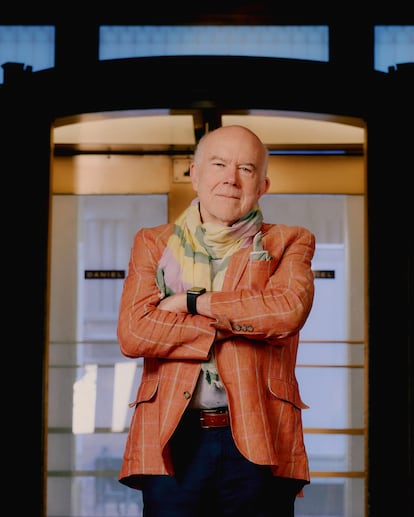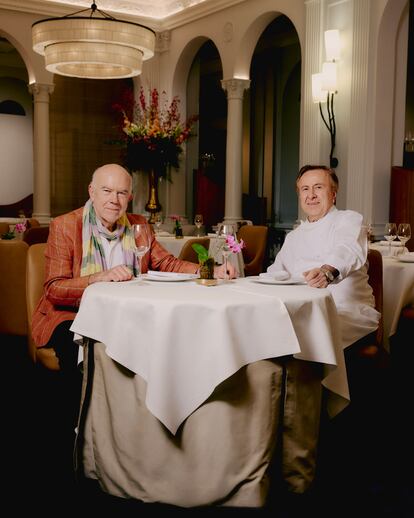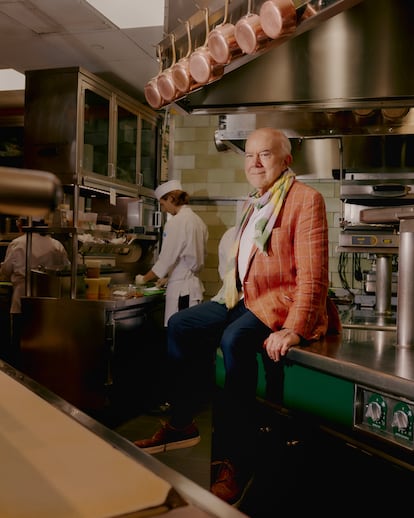Bill Buford, journalist: ‘Borders marked by oils or sauces are much more important than political borders’
Journalism, literature, gastronomy, travel, soccer and family (disagreements included) make up the gargantuan personal menu of the US writer, who has edited prestigious magazines such as ‘Granta’ and ‘The New Yorker’

Bill Buford’s CV includes being an editor at Granta and The New Yorker. The 70-year-old native of Baton Rouge, Louisiana, was also a temporary member of the most violent faction of Manchester United’s fanbase, as well as a kitchen apprentice at a legendary Italian restaurant, Babbo, in New York City
Buford has lived in the Big Apple almost all his life, except for the periods when he traveled around Europe to write Among the Thugs (1990), a fascinating account of how he infiltrated English soccer hooligan culture. The book ends with him being severely beaten in the streets of an Italian city during the 1990 World Cup. Later on in life, he also spent five years in Lyon, France, writing the book Dirt: Adventures in Lyon as a Chef in Training, Father, and Sleuth Looking for the Secret of French Cooking (2020). In it, the gonzo journalist — who despises the narcissism of the genre — recounts his experience as an apprentice in high-end kitchens in the French gastronomic capital. What was supposed to be a brief family adventure (Buford moved to France with his wife and two-year-old twins) turned into a five-year-long learning process that goes far beyond gastronomy, intertwining family crises with pig slaughters. He also delves into the aggressive bullying that can be inflicted on the lower-level employees who work in the kitchens of celebrated chefs.
Via Zoom, EL PAÍS spoke with Buford on three occasions, interviewing him about French gastronomy, his time in Spain in the late 1970s, why soccer hooliganism never took hold in the United States, the dangers of moving with children to the countryside, author Ryszard Kapuściński (1932-2007), his true hero, and his creative rhythm. Buford explained his unique method of managing time, space, and resources (which nobody understands, but it works for him).
Buford is a chaotic guy who knows how to make a fabulous chicken broth… or so he claims. But during the interview — with his cat prowling around on-camera — we’re inclined to believe him. He doesn’t give off the aura of a Hunter S. Thompson-like figure, telling fibs in some Nevada brothel.
Question. As we approach the end of 2024, is it strange to discuss a book that you started writing in 2008 and published in 2020?
Answer. Each of the books I write has a long life. They’re born, fade away… then, they’re reborn and they come back. For example, this year, I’m talking about Among the Thugs more than ever. And it seems that they’re going to turn [Dirt] into a TV series. We’ve traveled back to Lyon twice more, with the director and the screenwriter. The books have returned to the public… and to me as well.
My children are now angry and unbearable teenagers, but they speak almost perfect French thanks to the time we spent in Lyon [when I was working on] this book. One of them even cooks and makes steak tartare for his girlfriend. This book was our life and it ruined us. Still, we were very happy. A couple of nights ago, we were talking about it. It was a privilege to be able to have that experience. [The family and I] see ourselves partly as Lyonnais.
Q. During the process of writing your previous book, you emerged as a different person, with a changed life. But with your book Dirt, this transformation extended to your entire family.
A. It’s my fault. I’m a slow person… I write fast, but I’m slow to finish things. Everything takes me time, a lot of time. The idea was to go to Lyon for one summer and write. [We became part of the society] very quickly. You don’t make friends easily there, but when you become friends, they’re friends for life. And, if you behave badly, they hold a grudge against you forever. In the end, we were there for five years. And, while it changed me, it also changed my wife and my children.
Q. Lyon was a new city for you: French cuisine, French cooking techniques, the unknown language… and, well, you had just become the father of two twins. This book could belong to almost any genre.
A. No doubt about it! Everything was new… well, I wasn’t so “new” anymore. The time I spent at Granta made me learn to go deeper into reporting and to accomplish things you don’t normally achieve otherwise. And these are things that affect you deeply… you come back with the key elements, even if they don’t fit with your original idea. This wasn’t meant to be my family’s story, I swear. [But] in the TV series, my family is going to be even more important than in the book. It was a brutal life experience.
Q. How do you manage to be accepted into such different tribes, whether they’re English hooligans or French chefs?
A. I think it’s just about being there; being clear [about your intentions] and spending time with them. I’m very curious, very much so. You have to put yourself out there and show your interest. And [you cannot be] cynical, but genuine. If you’re patient and keep asking questions, they end up accepting you.
Q. Is it important that your books feature you, but are never just about you?
A. I’m always careful not to seem smarter or more important than I am. Doing that is shit. It doesn’t work. In Mario Batali’s kitchen, I remember there was a guy who had a huge influence on everything and always proved that he was the best. I unconsciously started to compete with him… until Batali told me not to even think about writing about that, that it was like narrating a dick-measuring contest and that my dick didn’t interest anyone. I had to throw [all the pages] away and get the whole pissing contest out of the narrative. And the book improved.
In the end, I’m more of a seeker of comedy. And I do that in life, too, much more than measuring my dick against somebody else’s. It comes more naturally to me than making myself important. There’s something about writing in the first person that’s very dangerous. You mustn’t forget that the story is about what happens and the first person [narrative] is only utilized because you’re the investigator. You have to be prepared to take yourself out of the story if necessary. I’m not the one who makes my books interesting. I’m there [cooking] my steaks, making my wife angry, scaring my children… and, in those scenes, I’m just one more character. Someone just has to narrate it. That’s all.
Q. Over the course of your slow writing, French cuisine went out of fashion twice and came back into fashion just as many times since you moved to Lyon. How did this affect your work?
A. When I went to France, the country was very out of fashion in most of the world, it’s true. Very much so. The French, however, weren’t very interested in what the rest of the world said about their cuisine. But when I returned to New York five years later, there was a renaissance of French gastronomy in the city. And then, things got complicated again. These shifts don’t help the book at all. And if I weren’t so slow in publishing, perhaps I could [catch the trend], it’s true.

Q. How do you think that a book like yours — which glorifies the French culinary tradition — is read in another country that’s also proud of its gastronomy, such as Spain? Is it taken as an affront?
A. It’s complicated. I have no idea, really. In Catalonia, it seems that everyone who cooks has the genes of [Salvador] Dalí and there’s a kind of wonderful culinary anarchy. It’s fabulous and, as with Basque cuisine, it has somewhat overshadowed French cuisine in certain recent periods. Of course, I think that anyone who likes to cook should be interested in the technique and style that the French have been perfecting in such a scientific way for more than 400 years.
There’s no doubt that the discipline, training, and attitude that you get from a French kitchen are incomparable. You can tell whether or not someone has been trained in France by how they put down their cutting board. You learn it there and it sticks in your head forever. And [the chefs] are very tough. Michel Richard — a chef who appears in this book — believes that, in an environment filled with lots of learning and rules, what you achieve is to open your mind and become more creative… even if, intuitively, you think the opposite [of the head chef]. Discipline is a way of provoking creativity. And by truly learning the technique, you read the recipes as successions of ideas, not as mere instructions.
Q. You traveled to Galicia in the late 1970s, correct?
A. I spent the summer there in 1978. I was on a scholarship to Cambridge and had some money to travel. I went straight to Spain. They told me to avoid Barcelona and Madrid and, well, I ended up in a town in the Rias Baixas. I even learned a little Galician. The road had only been paved the year before and there were still wagons. The bagpipes were playing in the bars. Everything was wonderful. I loved it. I have to go back. It must have changed a lot, of course. The wine in bowls, that shocked me.
Q. You learned the country’s rhythm.
A. Yes, without a doubt. I still [remember] everything. I’m a dreamer: I have a sentimental relationship with Spain, to be honest. It started when I was 15 and took Spanish classes. I was obsessed with Spanish classical music — very sentimental, very beautiful. It was my routine at school to get up at five in the morning and play the Spanish guitar for four hours. Then, I became obsessed with the Spanish Civil War. I spent my first two or three years in England thinking a lot about Spain. It was a romance. A youthful romance that still survives.
Q. Where did your passion for gastronomy begin?
A. You know, it began in Mexico. I spent a summer there and learned to make tortillas and mole. I came back home and cooked Mexican things non-stop… until I discovered Japanese cuisine and even started to learn the language. But where I really got serious about cooking was in England, where the food is awful. I was in a hotel where they gave us lamb with mint sauce. It was disgusting. The worst. But at home, my friends were decent cooks and they cooked almost every night… something that’s rarely done in New York, to be honest. That’s where I started to enjoy cooking. I also discovered that, if the food is good, the conversation around the table improves.
Q. Do you still get together with your children and your wife for dinner? How important is that in your family?
A. It’s essential. Magical. Right now, we’re living through a strange moment with my children. They’re 18 and they’re on a gap year before going to university. They’ve gotten angry with me because we’ve moved to the countryside, in the northern part of the state of New York. For me, family dinner is still key. And we started this when the twins were four years old. They were already helping out. It was a really funny mess: all the food in their hair, on the floor, on the table… but it was profound, a very profound experience. There, in front of the plate and around the table, you make plans, you tell stories. We’ve always saved our stories for dinner. But don’t think that our dinners are contests of wit or intellect: we’re simple, we stick to funny anecdotes. We laugh a lot and we eat. You eat to live and you laugh to live. It’s one of the fundamental experiences of being human.
Q. Do you still eat at a late hour?
A. That’s a very complicated question. And a hot topic between my family and me. My wife wants to eat dinner no later than 7 p.m., so that she can go to bed early and get up early, too. My children also want to eat dinner before seven, because they get hungry. And I try. But I’ve found that, even if I start cooking very early — for example, in the morning — I end up serving dinner as if we were in Madrid. The problem is that, if you give me more time, I want to do more things. I make more dishes, more sauces. I think about what to do with the leftovers. Maybe we should move to Spain…
Q. Gutting pigs, throwing pots at each other in kitchens in Lyon, fistfights with hooligans in London or Turin… how important is violence in your writing? And how do you deal with it?
A. It’s vital and it’s always dealt with very carefully.
Q. Like in real life?
A. Exactly. For a writer, violence is a gift. When someone gets hit, it’s horrible: it affects your entire metabolism. But for a writer, it’s great, it breaks all the rules. You enter another reality when violence enters the picture. When someone gets hit in the real world, it’s not like in the movies: you hear the knuckles, the jaw, the skin. Everything creaks. You feel it. In Among the Thugs, there’s a scene where an Italian family is trapped when fans are tearing up the streets of Turin. You see a man trying to get his loved ones out of the mess and how [the soccer fans] beat him up. It’s the sickest and ugliest thing I’ve ever experienced. There’s a lot of detail in real violence. And, as a writer, you have to do it justice, you have to relate all of that. Since I don’t write about sex, I write about violence.
Q. You could still write about sex though, no?
A. Yes, sex and Spain. A pending [project].

Q. What are your thoughts on the rebirth of soccer hooliganism in Europe?
A. I never thought it would be a problem again. But it is. This year, I’ve done quite a few interviews and even a podcast about the book and hooliganism all over again. It happened in England and then all over Europe… then it stopped. The 1990 World Cup was kind of a full stop. What happened was that, the following summer, raves and ecstasy [became trendy] and all the people involved in hooliganism discovered pills and techno music. Their priorities changed.
Q. What do you like about soccer?
A. I love it, but there’s something about soccer that’s frustrating. It’s beautiful… it’s the beautiful game, no doubt. But it’s extraordinarily frustrating. Look, I remember one of my first games in England. It was in Leeds. I was sitting with all these hardened gentlemen, regulars at the stadium. Every time the ball got close to the goal, they had a terrible time, they became fragile. And, in the end, the game ended 0-0. That’s exactly what soccer is. I love it.
Q. Did you go to see any games on your last visit to London?
A. No. And that needs to be remedied soon. What I did do in London was meet up with a couple of people I’ve known since my days among the hooligans. I was very glad to see that they’re still alive!
Q. Why is it that hooligan violence never spread across the U.S. like it has across Europe?
A. I don’t know. Maybe it has to do with American individualism. Violence in European sports is tribal. I know there have been fights at basketball finals in the U.S., but that’s rare… and it almost always happens in Chicago, it’s a Chicago thing. And it’s just about breaking things or fighting each other, it’s not like European soccer.
Q. Have you been cooking lately?
A. I’m in a phase where I make a lot of broth. A lot of chicken broth. I learned to make a duck broth base as well, I do it all the time. My chicken broth — cooked for 14 hours — is serious business. I spent over a year perfecting it at 60 or 70 degrees. I play around a lot now with sauces, with vinegars and citrus. I’m in the poultry phase, for sure. I want to make my own pasta again, it’s straightforward, supposedly easy. I don’t make it with a machine… it’s a talent I have. In the past, we didn’t have a big kitchen to make it, but now we do and I want to get back to pasta. And I’m going to open a pop-up restaurant. Daniel [Boulud, the French chef], is excited about that.
Q. Did the Italians really invent French cooking?
A. It’s not far-fetched. In the 16th and 17th centuries, there were a lot of cookbooks and a lot of translations. The French wanted to achieve what the Italians achieved earlier in the Renaissance, when cooking was just another artistic discipline. It developed a lot. There’s a lot of cooking from that period that has evolved and created a model that inspired the French. Even setting the table is an Italian idea, developed later by the French.
Q. Do you know about the map that divides Europe, between countries that cook with olive oil and countries that cook with butter?
A. I’ve heard about it many times.
Q. Is this a form of European division?
A. Yes. There’s gastronomic nationalism, just like there’s sporting nationalism. That’s true. However, I think culinary nationalism is more regional than national. I really like places where the border is porous, like the Italian-French border. That’s where the culinary traditions of both places intersect. It’s something terribly delicious. These borders — which are marked by oils or sauces — are much more important than political borders. They’re older and truer. The Mediterranean, for example, is a state of mind shared by people with very different passports.
Q. How is your new project progressing? Or, rather, do you have a new project?
A. I like your question because you assume that it’s hard for me to focus on a project, let alone finish it! That said, I’m finishing a book I started two decades ago when I returned to the U.S. after a stay abroad, [when I was doing] a sort of “letter-from-New York” format that was broadcast on BBC Radio 3. Some of those stories were published in The New Yorker, others in The Guardian. I’m also about to finish a book with Daniel Boulud about old-school French recipes, most of them from the 19th century. We’re almost there.
After the sale of the Granta archives to the British Library, I’ve really enjoyed digging through boxes of handwritten letters and other artefacts. I think I’d like to tell the story of the magazine and how exciting it was to live in Britain during those years.
Q. The author and journalist Ryszard Kapuściński was your hero. What are your memories of him?
A. He was the man… he was my man. I loved him and he loved me. The new journalism that my compatriots were doing always seemed narcissistic and excessive to me. But Kapuściński was the master of tone. He told stories with a natural talent. He was the writer I felt closest to. I went to meet him in Warsaw, everything was in chaos. The communist regime was about to fall and there were soldiers in the streets… a lot of tension and nervousness. It was a very Kapuściński moment, really. He was very generous with me. I’ll never forget it. And I had the honor of publishing his work in Granta. I don’t know how to say it… he was a giant. He did everything I wanted to do in life. A fabulous man [sobs]. I miss him very much.
Sign up for our weekly newsletter to get more English-language news coverage from EL PAÍS USA Edition
Tu suscripción se está usando en otro dispositivo
¿Quieres añadir otro usuario a tu suscripción?
Si continúas leyendo en este dispositivo, no se podrá leer en el otro.
FlechaTu suscripción se está usando en otro dispositivo y solo puedes acceder a EL PAÍS desde un dispositivo a la vez.
Si quieres compartir tu cuenta, cambia tu suscripción a la modalidad Premium, así podrás añadir otro usuario. Cada uno accederá con su propia cuenta de email, lo que os permitirá personalizar vuestra experiencia en EL PAÍS.
¿Tienes una suscripción de empresa? Accede aquí para contratar más cuentas.
En el caso de no saber quién está usando tu cuenta, te recomendamos cambiar tu contraseña aquí.
Si decides continuar compartiendo tu cuenta, este mensaje se mostrará en tu dispositivo y en el de la otra persona que está usando tu cuenta de forma indefinida, afectando a tu experiencia de lectura. Puedes consultar aquí los términos y condiciones de la suscripción digital.









































